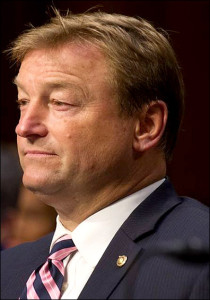By Jim Ellis — Thursday, March 7, 2023
Senate
Arizona: Sen. Sinema Bows Out — In addition to all the election results on Super Tuesday, Sen. Kyrsten Sinema (I), not seeing a victory path for herself, announced that she would not seek a second term. The Independent senator thanked Arizonans in a video message (above) for allowing her to serve for 20 years in the state House of Representatives, the US House, and the US Senate. At least in the short term, the Sinema departure appears to give Rep. Ruben Gallego (D-Phoenix) the inside track to winning the Arizona Senate seat over former GOP gubernatorial nominee Kari Lake.
The Sinema retirement decision means there are eight open Senate seats among the 34 statewide campaigns in the current election cycle.
President
Nikki Haley, Dean Phillips: Exit Presidential Race — Yesterday brought two campaign suspension announcements that at least unofficially clinch the respective Democratic and Republican presidential nominations for President Joe Biden and former President Donald Trump. Both Rep. Dean Phillips (D-MN) and ex-UN Ambassador Nikki Haley (R) indicated they are ceasing campaign activity, and thus ending any competition in the presidential nomination campaign.
Trump looks set to become the Republican presumptive party nominee on March 12, while President Biden will do so on March 19. The presumptive nominee is the individual who has secured a majority of legally bound first ballot delegates (1,968 for the Democrats; 1,215 for the Republicans), which guarantees a candidate the party nomination.
Rep. Phillips, who is not running for re-election to the House, publicly endorsed President Biden, while Haley did not announce support for Trump in her suspension declaration address, and said, “It is now up to Donald Trump to earn the votes of those in our party and beyond it who did not support him. And I hope he does that.”
Super Tuesday: GOP Turnout Overwhelms — In looking at the 14 Super Tuesday states where both parties held nomination events, in only two, California and Massachusetts, did more Democrats vote than Republicans. Among the more than 14.65 million people who voted in a major party Super Tuesday event, 60.6 percent chose to vote in the Republican primary. In even stalwart Democratic states such as Colorado, Maine, Minnesota, Vermont, and Virginia, more voters cast a Republican ballot than a Democratic. This is a bad sign for President Biden, as primary turnout often is a good indicator of voter enthusiasm.
Republican Leadership: Sen. Barrasso Not Running for Leader — Wyoming Sen. John Barrasso announced yesterday that he would not join the Republican Caucus battle for Leader to replace Mitch McConnell (R-KY). Instead, Sen. Barrasso announced that he will run for the Caucus’s number two slot, that of Senate Republican Whip. In the race for Leader are Sens. John Thune (R-SD) and John Cornyn (R-TX). Reports suggest that Sen. Rick Scott (R-FL) is also considering entering the race. Of the three potential Leader campaign combatants, Sen. Scott is the only one seeking re-election this year.

 April 29, 2019 — The Morning Consult organization released the first quarter approval ratios for all 100 senators, and it appears that quite a number of the 2020 in-cycle incumbents need to improve their ratings before facing the voters next year. In fact, when looking at the ratio spread from positive to negative, seven of the 10 weakest performers will be on the next ballot.
April 29, 2019 — The Morning Consult organization released the first quarter approval ratios for all 100 senators, and it appears that quite a number of the 2020 in-cycle incumbents need to improve their ratings before facing the voters next year. In fact, when looking at the ratio spread from positive to negative, seven of the 10 weakest performers will be on the next ballot.



